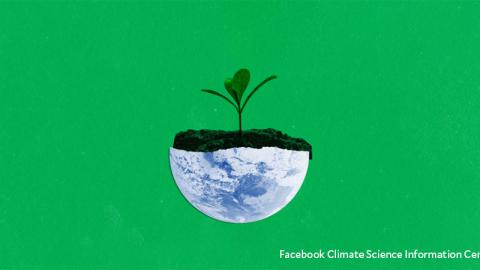

The Yale Program on Climate Change Communication (YPCCC) is playing a key role in Facebook’s new initiative to combat the spread of climate change misinformation on its platform.
Facebook announced this month it is expanding the Climate Science Information Center it launched in September to a dozen additional countries, including translations into local languages. The center directs users to facts about climate change from reputable scientific organizations, including the Intergovernmental Panel on Climate Change (IPCC), U.N. Environment Programme (UNEP) and the Yale School of the Environment.
Facebook also announced a new “myth-busting” unit, which debunks six common myths about climate change, including claims that scientists don’t yet agree human-caused global warming is happening, that polar bear populations are actually increasing, not decreasing, or that global warming is just the result of a natural cycle. The social networking site will also add Climate Science Information Center tags on all climate change posts.
“Misinformation about climate change long predates the internet but has been greatly amplified in our new digital world. This new myth-busting section of the Facebook Climate Science Information Center can help raise public climate change awareness and understanding worldwide,’’ said Anthony Leiserowitz, senior research scientist and director of YPCCC.
Global research conducted by YPCCC in partnership with the Gallup World poll found a huge gap in public awareness about climate change; nearly 40%, or nearly 2 billion adults worldwide, knew little to nothing about climate change. Meanwhile, misinformation continues to spread on digital platforms like Facebook, which has nearly 3 billion users. For example, a national survey conducted by YPCCC in December 2020 found that only one in five Americans understands that more than 90% of climate scientists think human-caused global warming is happening.
Leiserowitz, along with John Cook from George Mason University Center for Climate Change Communication and Sander van der Linden, director of the University of Cambridge Social Decision-Making Lab, worked with Facebook to develop evidence-based refutations of climate misinformation on their platform.
The Climate Science Information Center, which is currently accessible to Facebook users in France, Germany, U.K. and the U.S., will now also be available in Belgium, Brazil, Canada, India, Indonesia, Ireland, Mexico, the Netherlands, Nigeria, Spain, South Africa and Taiwan.
Facebook announced this month it is expanding the Climate Science Information Center it launched in September to a dozen additional countries, including translations into local languages. The center directs users to facts about climate change from reputable scientific organizations, including the Intergovernmental Panel on Climate Change (IPCC), U.N. Environment Programme (UNEP) and the Yale School of the Environment.
Facebook also announced a new “myth-busting” unit, which debunks six common myths about climate change, including claims that scientists don’t yet agree human-caused global warming is happening, that polar bear populations are actually increasing, not decreasing, or that global warming is just the result of a natural cycle. The social networking site will also add Climate Science Information Center tags on all climate change posts.
“Misinformation about climate change long predates the internet but has been greatly amplified in our new digital world. This new myth-busting section of the Facebook Climate Science Information Center can help raise public climate change awareness and understanding worldwide,’’ said Anthony Leiserowitz, senior research scientist and director of YPCCC.
Global research conducted by YPCCC in partnership with the Gallup World poll found a huge gap in public awareness about climate change; nearly 40%, or nearly 2 billion adults worldwide, knew little to nothing about climate change. Meanwhile, misinformation continues to spread on digital platforms like Facebook, which has nearly 3 billion users. For example, a national survey conducted by YPCCC in December 2020 found that only one in five Americans understands that more than 90% of climate scientists think human-caused global warming is happening.
Leiserowitz, along with John Cook from George Mason University Center for Climate Change Communication and Sander van der Linden, director of the University of Cambridge Social Decision-Making Lab, worked with Facebook to develop evidence-based refutations of climate misinformation on their platform.
The Climate Science Information Center, which is currently accessible to Facebook users in France, Germany, U.K. and the U.S., will now also be available in Belgium, Brazil, Canada, India, Indonesia, Ireland, Mexico, the Netherlands, Nigeria, Spain, South Africa and Taiwan.
Published
February 24, 2021